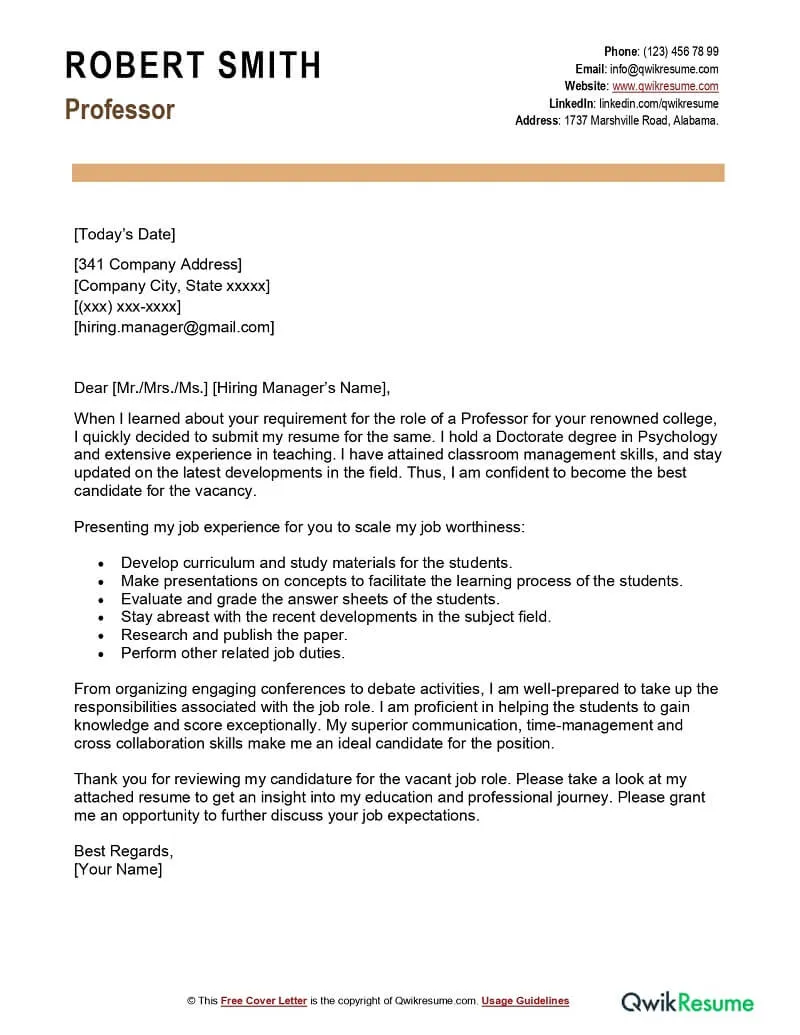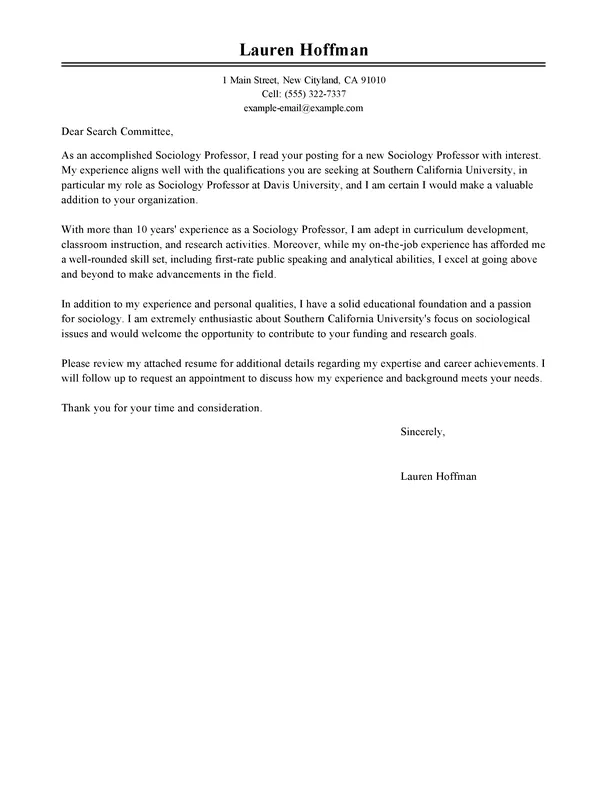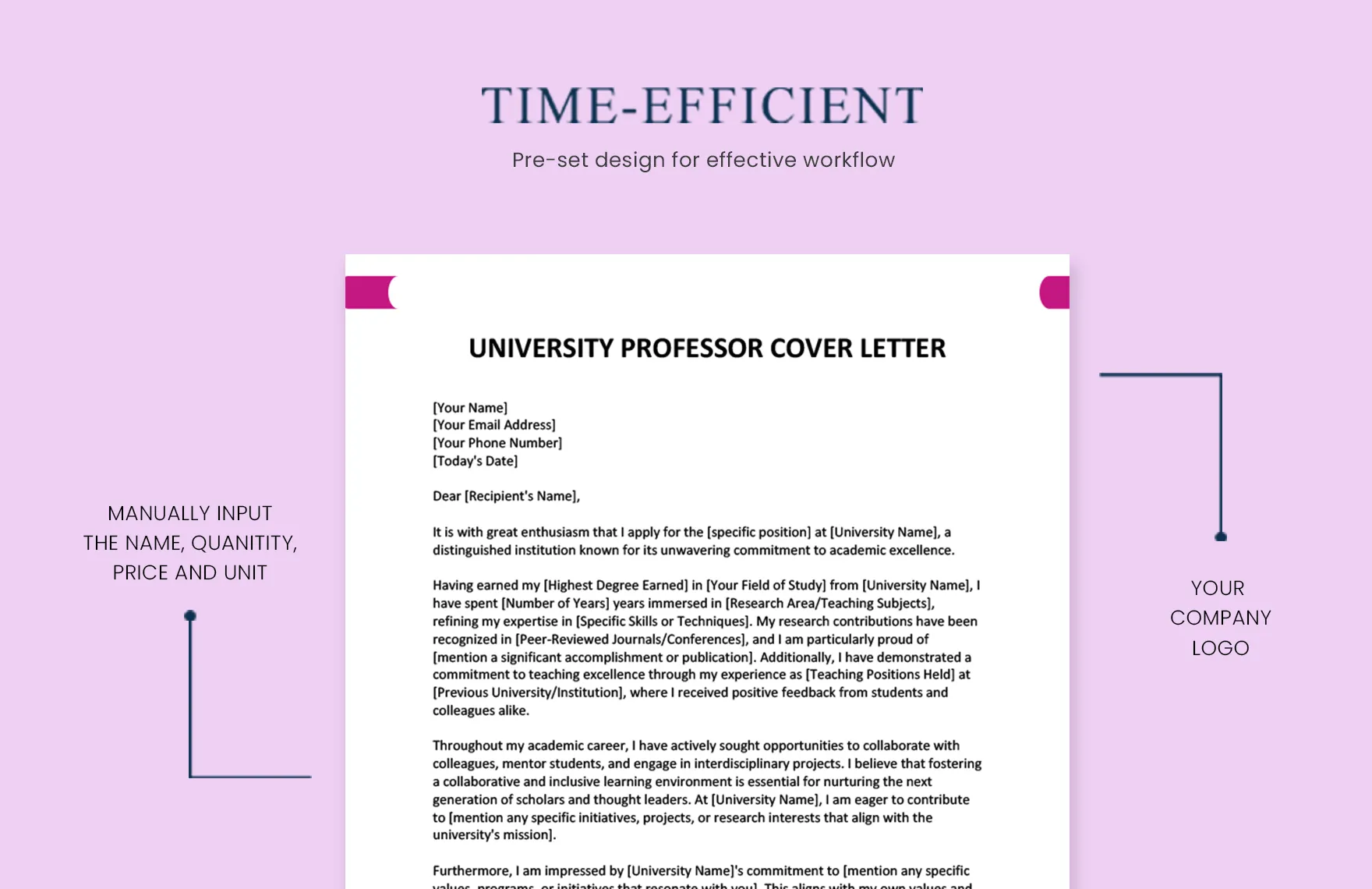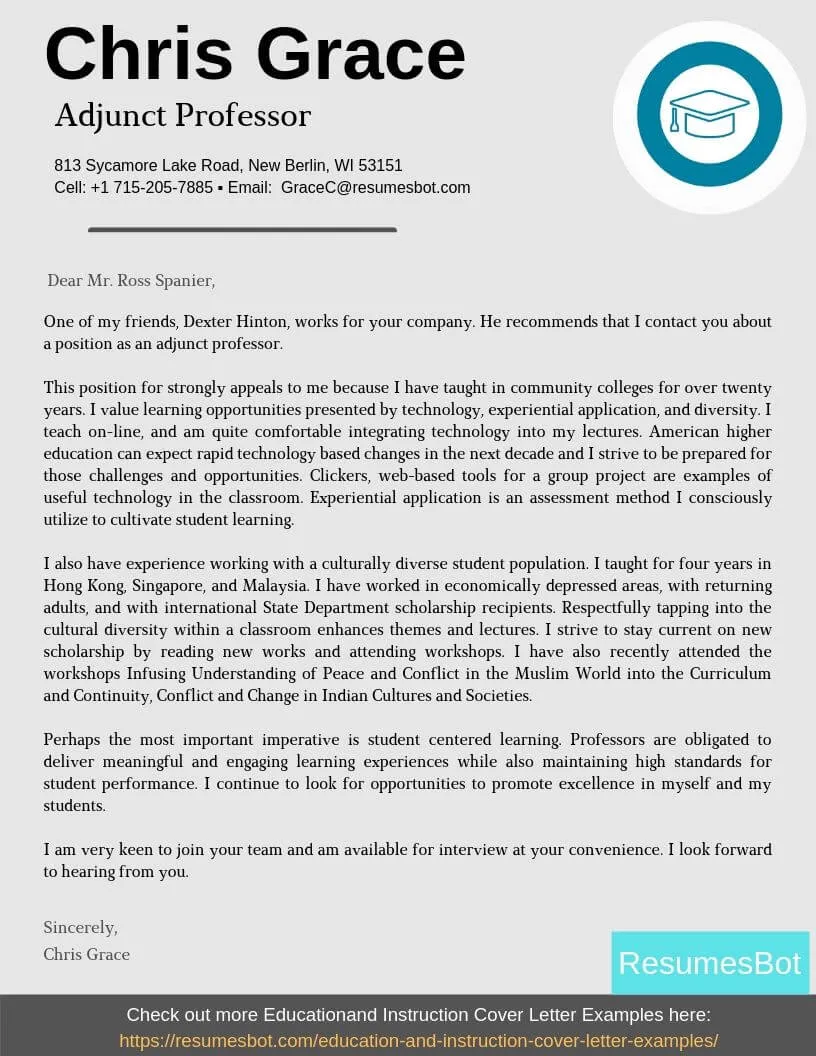What is a Cover Letter and Why is it Important?
A cover letter is a crucial document that accompanies your resume when applying for academic positions, research opportunities, or any role where you will be interacting with professors. Unlike a resume, which provides a factual overview of your qualifications, a cover letter offers you the chance to tell your story, express your enthusiasm, and demonstrate your suitability for the specific opportunity. It acts as a personal introduction, allowing you to highlight how your skills, experience, and research interests align with the professor’s or the department’s needs. The importance of a well-crafted cover letter cannot be overstated; it is often the first impression you make on a potential employer or supervisor, and it can significantly influence whether your application moves forward.
A compelling cover letter can differentiate you from other applicants, especially in competitive academic fields. It allows you to showcase your personality, communication skills, and genuine interest in the position. Furthermore, it gives you an opportunity to explain any gaps in your resume, address specific requirements mentioned in the job description, and express your career aspirations. In essence, a cover letter helps you to humanize your application, making it more memorable and persuasive than a simple list of accomplishments.
Key Elements of a Cover Letter for Professors
A strong cover letter for professors should include several key elements. Start with a professional heading that includes your contact information and the date. Address the letter to the specific professor or search committee if possible; if not, use a general salutation like “Dear Search Committee.” The first paragraph should state your purpose and where you found the job opportunity, and clearly state the position or research area you are applying for, and express your enthusiasm. The body of the letter should highlight your most relevant skills and experiences, aligning them with the requirements of the position or the professor’s research interests. Focus on what you can offer and how your abilities can benefit the professor or department.
Be sure to explain why you are interested in working with this specific professor or in this particular department. Refer to their research, publications, or projects that have inspired you. This shows that you’ve done your homework and have a genuine interest. Quantify your accomplishments whenever possible. Use numbers and data to demonstrate the impact of your work, such as the number of publications, grants secured, or students mentored. The closing paragraph should reiterate your interest, express your gratitude for their time, and offer to provide additional information or materials. End with a professional closing, such as “Sincerely” or “Best regards,” followed by your name.
Highlighting Your Skills and Qualifications

When highlighting your skills and qualifications, focus on the aspects most relevant to the position or research opportunity. Read the job description carefully and identify the key skills and experiences the professor or department is seeking. Then, provide specific examples from your past experiences that demonstrate these skills. For example, if the position requires strong research skills, describe your research projects, methodologies used, and any outcomes achieved. If it requires teaching experience, mention courses taught, teaching evaluations, or innovative teaching methods used. Use action verbs to describe your accomplishments, such as “conducted,” “analyzed,” “developed,” “led,” and “managed.”
Tailor your letter to showcase the unique value you bring. Don’t just list your skills; explain how you have applied them and the results you achieved. For example, rather than simply stating that you have experience with statistical analysis, describe the specific statistical methods you used and the insights you gained from your analyses. If you have any publications, presentations, or awards, be sure to mention them, emphasizing their relevance to the professor’s research area. Finally, be sure to proofread your letter carefully to eliminate any grammatical errors or typos that could detract from your professionalism and credibility.
Tailoring Your Cover Letter for Each Professor
One of the most important aspects of a successful cover letter is tailoring it to each professor or position you are applying for. Generic cover letters are easily identified and often dismissed. To tailor your letter, start by researching the professor’s work, publications, and research interests. Visit the department’s website, read their recent papers, and familiarize yourself with their current projects. Use this information to demonstrate your genuine interest in their work and explain how your skills and experiences align with their specific needs.
Incorporate specific details from the professor’s research into your letter. For example, if you admire their work on a particular topic, mention it and explain how your skills or research align with their interests. If the job description emphasizes specific skills or experiences, make sure your letter highlights how you possess these. Quantify your achievements whenever possible to showcase your impact and results. Avoid simply restating your resume; instead, use the cover letter to tell a story, highlighting your strengths and explaining why you are a good fit for the role. Personalize your letter to show that you have invested time and effort in learning about the professor and their work. This greatly increases your chances of getting a positive response.
Cover Letter Examples Tailored to Specific Roles
The structure and content of your cover letter should be tailored to the specific type of academic role you are applying for. Whether you’re applying for research positions, teaching positions, or postdoctoral roles, the focus and tone will vary. For research positions, emphasize your research experience, skills, publications, and alignment with the professor’s or lab’s research interests. Highlight your ability to conduct independent research, analyze data, and contribute to publications. Showcase any relevant grants or funding you’ve secured. Demonstrate a deep understanding of the research area and your ability to contribute meaningfully to ongoing projects.
For teaching positions, focus on your teaching experience, pedagogical skills, and ability to engage students. Describe the courses you’ve taught, your teaching philosophy, and any innovative teaching methods you’ve used. Include positive teaching evaluations or letters of recommendation that attest to your teaching abilities. Explain your interest in curriculum development, student mentorship, and fostering a positive learning environment. For postdoctoral positions, highlight your research expertise and how it aligns with the professor’s research agenda. Mention your publication record, grants, and any relevant skills. Focus on your potential to contribute to ongoing research projects and advance your career in academia. Tailoring your cover letter to the specific role increases your chances of making a strong impression.
Cover Letter Example for Research Positions

Dear Professor [Professor’s Last Name],
I am writing to express my keen interest in the Research Assistant position in your lab, as advertised on [Platform]. Having followed your groundbreaking work on [Research Area] for some time, I am deeply impressed by your contributions to the field, particularly [Specific Publication or Project]. My background in [Your Field] aligns perfectly with your research focus, and I am confident that my skills and experience would make me a valuable asset to your team. During my Master’s program at [University], I gained extensive experience in [Specific Skills], including [list skills, e.g., data analysis, experimental design, statistical modeling]. I have also published [Number] peer-reviewed publications, including [mention a relevant publication]. My research on [Your Research] has equipped me with a strong understanding of [relevant concepts], and I am eager to contribute to your ongoing projects. I am particularly interested in your work on [Specific Project] and believe my expertise in [Specific skill] would be a significant benefit. I am a highly motivated and detail-oriented individual with a strong work ethic. Thank you for your time and consideration. I look forward to hearing from you.
Sincerely, [Your Name]
Cover Letter Example for Teaching Positions
Dear Search Committee,
I am writing to express my interest in the position of [Position] in the Department of [Department Name] at [University Name]. I am a passionate educator with [Number] years of experience in [Field of Study], and I am eager to contribute to your department’s mission of providing high-quality education and fostering student success. Throughout my career, I have taught [Course Names], where I have developed and implemented innovative teaching methods to engage students and promote critical thinking. My teaching philosophy centers on creating an inclusive and supportive learning environment where students can explore their intellectual curiosity and develop essential skills. I have consistently received positive student evaluations, with an average rating of [Rating]. I am proficient in curriculum development, assessment design, and the integration of technology in the classroom. My research interests align with the department’s focus on [Department’s Focus], and I am committed to integrating my research into my teaching to provide students with a comprehensive learning experience. I am also dedicated to mentoring students and supporting their academic and professional development. I am confident that my skills and experience make me an excellent candidate for this position. I am eager to join your department and contribute to its continued success. Thank you for your time and consideration. I look forward to hearing from you.
Sincerely, [Your Name]
Cover Letter Example for Postdoctoral Positions
Dear Professor [Professor’s Last Name],
I am writing to apply for the Postdoctoral position in your lab, as advertised on [Platform]. Having been a dedicated follower of your research in [Research area] for years, I am highly impressed with your contributions and particularly [Specific contribution] that I followed with great interest. My Ph.D. in [Your Field] from [University] has equipped me with extensive experience in [Specific techniques, skills]. My dissertation focused on [Briefly describe your dissertation] and resulted in [Number] publications in peer-reviewed journals, including [Mention a relevant publication]. I am particularly drawn to your lab’s work on [Specific Project] and believe my expertise in [Relevant skills] would be a valuable asset. I am adept at independent research, grant writing, and mentoring students. I am enthusiastic about collaborating with your team to advance our understanding of [Research Area]. I am confident that my skills and experience align perfectly with the requirements of this position. I am a highly motivated, detail-oriented, and eager researcher. I would welcome the opportunity to discuss how I can contribute to your team’s success. Thank you for your time and consideration. I look forward to the possibility of discussing my application further.
Sincerely, [Your Name]
Formatting and Presentation Tips for Your Cover Letter

The formatting and presentation of your cover letter are crucial for making a positive first impression. Use a professional font, such as Times New Roman, Arial, or Calibri, and maintain a consistent font size (11 or 12 points). Use single spacing within paragraphs and double spacing between paragraphs for readability. Set margins to one inch on all sides. Keep your letter concise and focused, ideally one page long. Use clear headings and bullet points to organize your content and make it easy for the reader to scan. Avoid using jargon or overly complex language that might be difficult for the professor to understand. Ensure your letter is free of grammatical errors and typos; proofread it carefully, and consider having a friend or mentor review it as well.
Use a professional business letter format. Include your contact information at the top, followed by the date and the professor’s or committee’s contact information. The salutation should be formal and addressed to a specific person whenever possible. The body of the letter should be divided into clear paragraphs, each addressing a specific point or idea. Close your letter with a professional closing and your full name. If you are sending your cover letter electronically, save it as a PDF to maintain the formatting and ensure that it looks the same on all devices. Choose a clear and concise file name, such as “YourName_CoverLetter.pdf.” Following these formatting and presentation tips will significantly enhance the professionalism and readability of your cover letter, increasing your chances of making a positive impression on the professor or search committee.
Proofreading and Editing Your Cover Letter
Proofreading and editing your cover letter is the final and most crucial step in the writing process. A polished and error-free letter demonstrates your attention to detail and professionalism. Before submitting your cover letter, carefully review it for any grammatical errors, typos, and inconsistencies. Read the letter aloud to check the flow and rhythm of the sentences. Check for correct punctuation, capitalization, and spelling. Ensure that the language is clear, concise, and professional. Consider having a friend, mentor, or career counselor review your letter. A fresh pair of eyes can often catch errors that you might have missed. Seek feedback on the overall clarity, structure, and content of your letter. Are your qualifications clearly presented? Does the letter effectively convey your interest and enthusiasm?
Ensure that your cover letter is tailored to the specific position and professor. Review the job description or research interests to ensure that you have highlighted the most relevant skills and experiences. Make sure your letter aligns with the professor’s or department’s requirements. Re-read the professor’s publications or website to verify that you have accurately described their work and research interests. By thoroughly proofreading and editing your cover letter, you’ll create a professional and compelling document. A well-crafted cover letter can significantly enhance your chances of securing an interview and ultimately landing the academic position or research opportunity you desire. Taking the time to refine your cover letter demonstrates your commitment to excellence.
